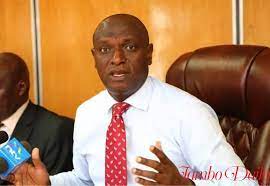
Kenya is bracing for a stormier ending of the Jubilee government after a taskforce constituted by Kenya President Uhuru Kenyatta to investigate the cause of high cost of electricity and fuel unearthed massive rot in the seat of power, besides raising the red flag over the role-played by Deputy President William Ruto and his allies in draining the taxpayer of dozens of billions of shillings.
The gist of the report was: consumers pay three times for what they do not get and the proceeds are wired to private bank accounts.
The taskforce’s report accuses the cabal around DP Ruto of pervasive conflicts of interest that has put economy on its knees, even as President Kenyatta repeatedly talks of leaving behind an enduring legacy when he retires in August next year.
In a word, the investigation was a delve into frenzied thieving of public resources, gluttonous cartelism and ruthless abuse of office the president now fears might haunt him as the most “helpless president” in the history of the country long after he leaves office.
The damning verdict by Presidential Taskforce on Review of Power Purchase Agreements that was handed to him a fortnight ago after six months of investigations, has reportedly forced the president to relook at his increasingly strained relations with his deputy as the public accuses him of presiding over of the freefall of the economy and unprecedented rise in economic crimes.
At one end of the stick is former Cabinet Secretary for Energy Charles Keter, a bosom friend of the deputy president. According to the taskforce chaired by economist John Ngumi, CS Keter – allegedly – promotes and protects the interests of Independent Power Producers (IPPs) in which DP Ruto is said to be a principal stakeholder.
On the other end of the stick is President Kenyatta pursuing – in vain – legacy projects in which manufacturing is a priority. The two are irreconcilable, the report shows.
Consequently, Internal Security Cabinet Secretary Fred Matiang’I announced on Thursday that the government would no longer enter into contracts with IPPs, pending a review of those entered by Mr Keter’s team. In addition, Dr Matiang’i, who doubles up as coordinator of cabinet affairs – a role previously reserved for DP Ruto – announced that KPLC had become a state project until all IPPs contracts were scrutinised and correct valuation determined as way of lowering the high cost of power.
The high cost of manufacturing triggered a rapid rise in inflation, which the Central Bank of Kenya said had hit a 19-month high of 6.57 per cent at the end of September after fuel and electricity costs rose by roughly 25 per cent.
“The controversial Power Purchase Agreements between KPLC Independent Power Producers were drawn by the cartel. The cartel co-owns those firms that sell power to KPLC at three times higher cost than what KenGen was selling to KPLC,” our source revealed.
In a government where the president and his deputy have always been talking at cross-purposes for the better part of past four years of their second term in office, the taskforce stunned the president with further revelations of massive financial fiddling and spirited protectionism of the interests of Independent Power Producers at the expense of collective public interest leading.
The taskforce estimates the through theft to run into dozens of billions of Kenya shillings.
On Friday (October 1), senior government officials close to the president opened up on why the head of state had to reassign Mr Keter and Principal Secretary who the president accuses of shielding the cartel behind the unexplained high cost of electricity and gasoline.
The revelations lifted the lid on the scandal of pricing of electricity tokens that elicited nationwide protests about inconsistencies, unavailability and non-compatibility to KPLC servers. The project ran aground, barely months after coming into force.
Interviewed, the official revealed that the president was miffed at the extent his own office had been used to exploit consumers. Redacted from the statement read on Wednesday by State House Spokesperson Kanze Dena were names of directors of the companies that tendered and were given contracts to sell power and provide other service to Kenya Power and Lighting Company (KPLC) Limited.
Ngumi’s taskforce says the cost of electricity and fuel in Kenya is three times it should be.
Virtually all the IPPs, President Kenyatta was informed, are owned by senior government officials – in his office! The revelations precipitated the transfer of Mr Keter to the less plummy Ministry of Devolution, where he replaced Eugene Wamalwa, who turn was deployed at the Ministry of Defence. Keter was replaced at Energy by Monica Juma, from Defence.
Our source at the taskforce made up of expertise in economics, engineering, finance, law and human resource management, revealed that the president is angry that the country had been forced to succumb to the political and economic connivance by a powerful clique in his government that thrives on financial fiddling and cartelism to rip off helpless consumers.
The revelations come at a time President Kenyatta succession politics has been cast as a competition between the haves and have-nots or in Ruto’s words, the “dynasties and the poor.” The DP identifies with the poor, a profile the taskforce report disclaims.
Asked to flesh out the terse two-page statement that was issued by State House spokesperson Kanze Dena, our source said their investigations had found that Keter and Principal Secretary Joseph Njoroge were at centre of tendering for power and fuel supply that raised the tariffs to three times the actual price in the market.
A senior government official explained, “The reasons for the reshuffle were mainly to get out of the energy docket the ‘Cartel’ – CS Keter and Principal Secretary Joseph Njoroge.”
The two, he says, have been adversely named in the report as the “godfathers” of the businessmen behind the fiddling that had pushed up the cost of fuel and power above the tariffs in other East African Community (EAC) member states.
The official adds via email that the president is now fully aware of the racket. “The two were veiled owners of the firms that had been contracted by Kenya Power and Lighting Company (KPLC) to sell power units – vend it. This deliberately immobilised the KPLC digital power purchase line to the advantage of private digital payment platforms.”
- A Tell report











